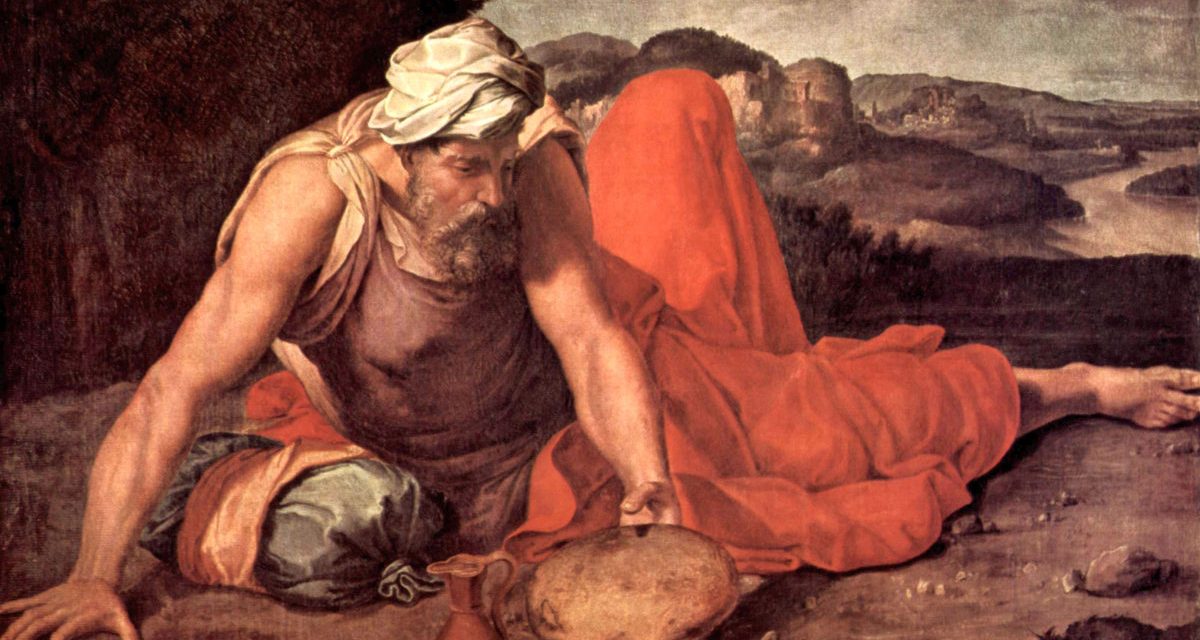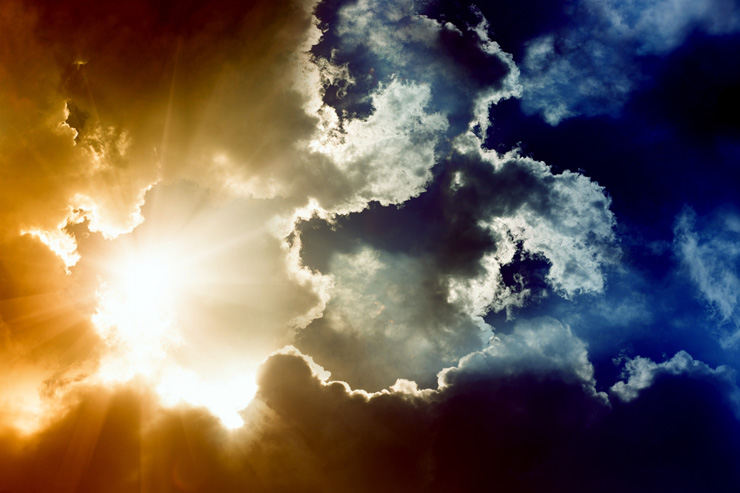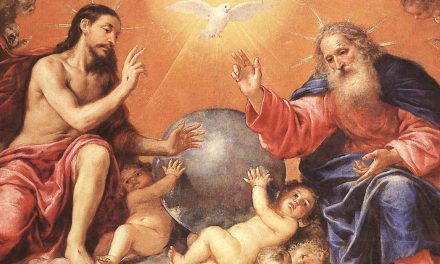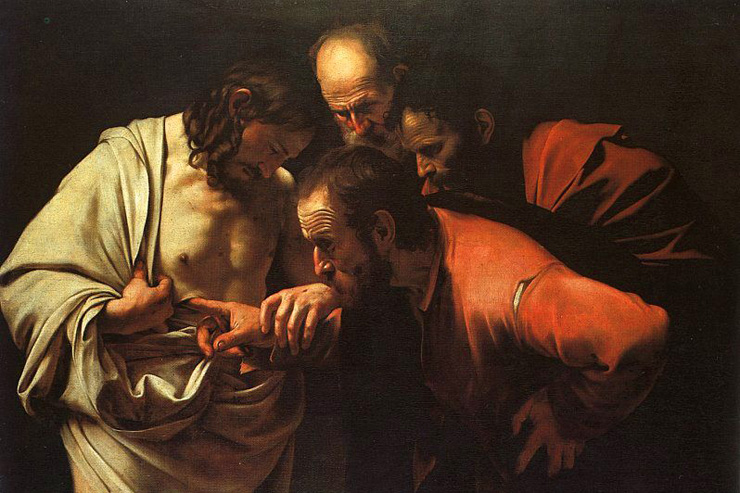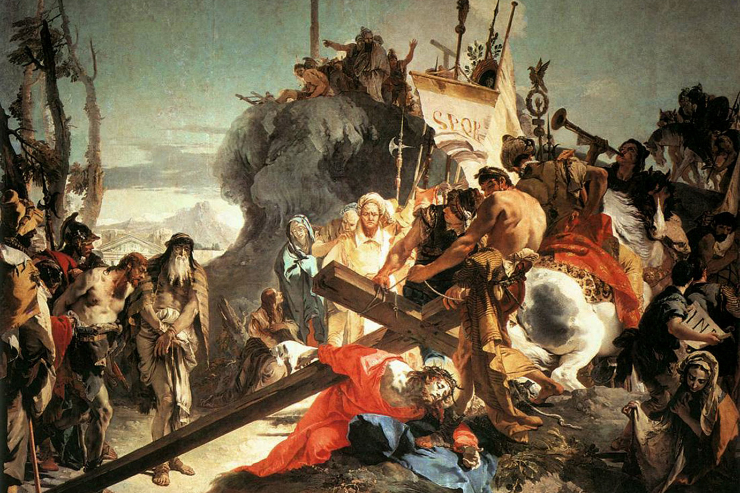“God has given himself to us in the Sacrifice of the Cross which is made present to us at every Mass and he has made available for us, for our spiritual and material strength, the Eucharist, Jesus, the Bread come down for heaven. Let us pray for wisdom and perseverance, and for renewed faith at this Holy Mass.”
Here’s a quick test for you! You didn’t know there was going to be a pop quiz, did you? I thought one might be in order to celebrate the start of the coming school year. Yes? No? Seriously! Here’s the question…
“Who was the famous prophet in today’s first reading?”
The prophet is none other than Elijah! In his ministry, he prefigures Jesus especially by the miracles he works. He’s good to get to know.
Since the first reading today is very short, I am afraid it leaves out the context for what is taking place, so let’s look at the broader story of Elijah, the loftiest of the Old Testament prophets.
We learn about Elijah in the First Book of Kings. The two books of the bible that we know as First and Second Kings present the historical account of the kings who succeeded King David.
In 937 B.C., the kingdom divided into the northern Kingdom (Israel) and the southern Kingdom (Judah) where Jerusalem is located. In 722 B.C., Israel was conquered by the Assyrians, leaving only the two southern tribes in Judah. Judah eventually fell to the Babylonians in 586 B.C. with the destruction of Jerusalem.
If anyone thinks history is boring, I challenge you to pick up the bible and read these two books. It is the story of God’s involvement in the history of Israel and Judah as he guides their history and reveals His holy will. If the Israelites and their kings had just remained faithful to their covenant with God, they would have avoided these disastrous events.
It is during the period of the divided kingdoms that Elijah comes on the scene in Israel to the north and it is in the time of Israel’s King Ahab and Queen Jezebel that today’s reading takes place.
Jezebel, a foreigner, influenced her husband Ahab to promote worship of the false God Baal in Israel. She imported into Israel hundreds of priest-prophets. And she had all the true prophets of Israel killed, except for one hundred who were hidden from her. This idolatry is consistent with much of the sad history of the two kingdoms, but particularly the northern. And into this disaster in the making, God sends the great early prophet, Elijah.
Elijah, like many prophets tells it like it is and proclaims the truth with force. He confronts the King, Ahab, and because of the idolatry, he calls down a drought upon the land that will last three years. For a while Elijah lives by a brook where God sends ravens to bring him bread and meat each day and where he can drink from the brook.
Eventually, the brook dries up due to the drought and Elijah goes into Sidon where he meets a widow and her son. She has only enough flour and oil to make one more bread cake for her and her son to eat before they die. Elijah tells her to make a cake for him. Although she protests, she does what he asks. For a year, Elijah stays with her and her household and just as he foretold, God never lets the flour and oil run out. He taught her to trust in the Lord for her bounty.
This is why many parishes have the Elijah Cup devotion. At the end of each Mass, a family takes home a chalice, the Elijah Cup, and places it in a prominent spot in the home as a reminder to pray for vocations to the priesthood and religious life. We call upon the intercession of the prophet Elijah for God to send us holy priests so that we will not run out.
But the story of Elijah and the widow is not over. Her son becomes ill and dies. Elijah takes the boy from her and prays over him for God to restore him to life. The boy is raised from the dead by Elijah’s prayers. Do you begin to see how the miracles performed by Elijah in his roles as prophet foreshadow the ministry of Jesus?
Let’s jump ahead two years. The drought has been ravaging the country for three years now. Elijah once again confronts Ahab. He taunts the king and challenges him to bring together all the false prophets of the false God Baal to Mount Carmel. There will be a contest of sorts between the One True God of Israel and the false god, Baal.
Two altars of sacrifice are constructed and wood is placed on them and upon each is placed a slaughtered bull for sacrifice. Which god will send down fire to consume the offering? The false prophets shout and scream, they dance and jump, the mutilate themselves with knives until they bleed, but their false god does nothing. Elijah, ever the prophet, taunts them and suggests that their king must be on a journey or maybe he is taking a nap! Next, Elijah has water poured all over his wood and altar until it is drenched and standing water has filled the trench around it. Then Elijah prays to the One True God who promptly sends down flames that consumes the offering and dries up the water.
The people of Israel, reminded now of God’s power, destroy all the false prophets. A great victory for Elijah on Mount Carmel. A great day for the Lord!
You would think this would be the place for a happy ending, but life is seldom the way we hope or want. Jezebel vows to kill Elijah and convinces the King make it so. Thus it is tht after so great a victory at Carmel, Elijah finds himself in despair and makes his escape, fleeing through the desert to Mount Horeb. And here we are at today’s first reading. He lays down under a broom tree and wants to die. He falls asleep. The Lord sends an angel to him to nourish him with food and drink. Elijah awakes and eats and drinks but is soon asleep once more. A second time the angel awakens Elijah and says to eat and drink so he will have strength to complete his journey. So Elijah does.
In Elijah’s journeys, God feeds him bread and meat, provides him drink, much the same as He did for the Israelites and Moses during their time in the desert when He gave them manna from heaven.
Our life is like this mad dash to Mount Horeb. We need food for the journey too and not just food for our physical strength.
Elijah arrives at Mount Horeb and tells God all is lost. Elijah is told to go outside the cave in which he is hiding and prepare to meet God who will reveal to him His will. First, there is a mighty wind, but Elijah does not hear God in it. Then there is an earthquake, but Elijah does not hear God in it. Then there is a great fire, but God is not in it. After all these there comes a small still voice like a small breeze and there Elijah meets the Lord where he is strengthened and given his final instructions to carry out as God’s prophet.
Life is like that too. The wind, the earthquake and the fire were the usual ways in which God was thought to appear. But our expectations of God are often wrong. Who could have guessed that God would appear in so small a way as a small voice? Who could have guessed that the coming Messiah would arrive as a small baby in a manger in Bethlehem? Who would ever in a thousand years have guessed that Jesus, Lord God, the Bread come down from heaven, would in fact be almighty God, body, blood, soul and divinity under the appearances of simple bread and wine.
But there you have it. Elijah, would was nourished by the Lord in his travels through drought and desert, foreshadows the arrival of the Messiah who nourishes us through our journey through our drought and desert which is this world as we journey towards our true home in heaven.
In our Gospel today, Jesus proclaims, “I am the living bread that came down from heaven; whoever eats this bread will live forever; and the bread that I will give is my flesh for the life of the world.”
What we should learn from today’s readings is this…
- First, the trials and tribulations that we encounter in this life are sometimes the result of our own lack of fidelity to God. Anything we place in our lives as being more important to us than God are idols, false Gods.
- Second, these trials, even when not caused by our personal sin, are opportunities to turn to God because his promises to us are real and unchanging.
- Third, God has given himself to us in the Sacrifice of the Cross which is made present to us at every Mass and he has made available for us, for our spiritual and material strength, the Eucharist, Jesus, the Bread come down for heaven. Let us pray for wisdom and perseverance, and for renewed faith at this Holy Mass.
Into the deep…
The scripture readings during Holy Mass for the Nineteenth Sunday in Ordinary Tine (Year B) are First Kings 19:4-8; | Psalms 34:2-3, 4-5, 6-7, 8-9; | Ephesians 4:30–5:2; | John 6:41-51;.
Image credit: “Elijah in the Desert” (detail) | Daniele da Volterra, Public domain, via Wikimedia Commons
Please help spread the Gospel. Share Deacon Bickerstaff’s article with family and friends on Facebook and other social media.
We are grateful for your support…
We welcome both one-time and monthly donations. A monthly subscriber giving just $10 a month will help cover the cost of operating Integrated Catholic Life for one day! Please help us bring enriching and inspiring Catholic content to readers around the world by giving today. Thank you and may God Bless you for supporting the work of Integrated Catholic Life!

